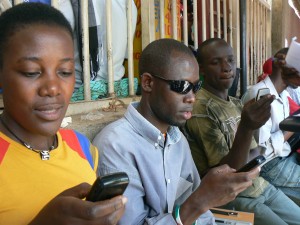The FrontlineSMS team is always keen to engage with those using FrontlineSMS for social change projects across the world. It is really valuable for us to hear user’s stories, and find out the advantages and challenges of using our software in action. This summer, Tufts University student and FrontlineSMS intern Emily Wyner visited Nairobi, with support from Groupshot and the Institute for Global Leadership, to find out more about FrontlineSMS users in this buzzing city. Here she shares her experiences of helping a youth project get started using FrontlineSMS software.

Throughout my time with FrontlineSMS, one thing has become very clear: effective program design is crucial to successfully integrating mobile software into social change initiatives. I was delighted when given the opportunity to help Plan Kenya (part of Plan International) in piloting their use of FrontlineSMS to help support their local partners. This was my chance to observe and assist the process of getting started with FrontlineSMS from initial thoughts, plans, and assumptions to final implementation. I have discovered some interesting things along the way, and it’s great to be able to share the beginning of this journey.
My initial visit with Plan Kenya was really exciting. I first spoke with Aggrey and Irumu, members of the Plan team, to give them a thorough run-down of what FrontlineSMS software is and does. They asked some brilliant questions about cost and requirements, and were keen to lay the groundwork for a sustainable project. We brainstormed smart ways to pilot the software on a small scale, such as using it for internal office communication and management or setting up one Nairobi-based youth group with FrontlineSMS to determine if it improves relations with their members. Soon enough, I was sent onward to meet with Purity and Bernard, Plan Kenya’s ICT experts. They too were very enthusiastic about the software, and promised to be in touch regarding some of the pilot prospects.
Following this they arranged for me to meet with some representatives from Jipange, an umbrella organization of 16 youth groups in the Embakasi area, and one of the organizations Plan Kenya supports. I went to meet with Jipange accompanied by Purity and Aggrey, as well as Adam from Groupshot and Jordan from TechChange, too. Plan Kenya had set up the meeting in order to discuss and arrange for Jipange to pilot FrontlineSMS in their programming.
Jordan, Adam and I began by giving the members of Jipange an overview of FrontlineSMS. Along the way, there were certain reactions that really stood out and some really insightful questions. I particularly remember a young woman named Wanjiru, founder of The Change Initiative, asking whether or not FrontlineSMS would allow her to send text messages to certain groups of people at a time, such as all the leaders of the 16 groups or all the members of one particular group. This led us to explain the suitability of the FrontlineSMS contact groups function for this project. This is the kind of question that is great to hear when introducing a new technology tool. It asks if FrontlineSMS has the capacity to do what Jipange already does (or needs to do) in a cleaner, faster, and easier way.
This is key; when a preexisting organization adopts the use of FrontlineSMS, the software should not necessarily fundamentally alter their programming; rather, it is a tool by which the programming can be made more efficient and effective. For all new users of FrontlineSMS it is necessary to know your target audience, why you are going to reach them, and how you intend on presenting yourself as a reliable, trustworthy communicator.
One eye on technology and the other on program design, the discussion with Jipange continued on with both eyes focused. More and more Jipange members joined in with questions and comments. People were chiming in with ideas about how FrontlineSMS could be used in good governance initiatives or the formation of a Jipange-run business. It became clear that everyone was set on starting to use the software.
Going forward, Jipange members (and the Plan Kenya staff who work with them) will now be in control of when and how they begin to use FrontlineSMS. They know the basics, there is support from FrontlineSMS if needed, yet most importantly they have a clear vision of how they intend on using FrontlineSMS for fundamental communication that is essential to their programming.
It will be great to keep in touch with Jipange and their progress with integrating FrontlineSMS into their daily activities. The members I met were enthusiastic and innovative, and it will be exciting to hear about the ways they go on to use FrontlineSMS in future.
Good luck, Jipange and all new FrontlineSMS users out there! Don’t forget to keep in touch. One of the best resources we have is each others’ stories.
- - -
If you're interested in using FrontlineSMS for your work:
You can download FrontlineSMS for free here on our website.
You can connect with other FrontlineSMS users and the team by joining our community forum here.
Find out how others are using the software by reading user guest posts on our blog here.






 A lack of communication can be a major barrier for grassroots non-governmental organisations (NGOs) working in developing countries. FrontlineSMS is the first text messaging system created exclusively with this problem in mind.
A lack of communication can be a major barrier for grassroots non-governmental organisations (NGOs) working in developing countries. FrontlineSMS is the first text messaging system created exclusively with this problem in mind.